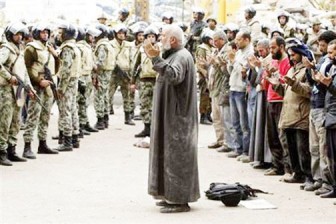CAIRO (Reuters) – Unrest in Egypt could turn increasingly vicious, leading opposition activist Mohamed ElBaradei warned yesterday, as President Hosni Mubarak clung to power after 12 days of demonstrations.
Mubarak has reshuffled his government, and the leadership of his party resigned yesterday, but the 82-year-old president insists he will stay in office until September polls.
Fearing instability in the most populous Arab nation where Islamists are the most organised opposition, the United States, Egypt’s key ally and aid donor, is emphasising gradual change and the need for talks between the government and opposition groups to forge agreement on an orderly handover of power.
US Secretary of State Hillary Clinton threw her weight behind talks between Mubarak’s handpicked vice president, Omar Suleiman, and opposition groups, saying the government’s fragile dialogue with the opposition must be given time to unfold.
“There are forces at work in any society, and particularly one that is facing these kinds of challenges, that will try to derail or overtake the process to pursue their own specific agenda,” Clinton told a security conference in Munich.
She did not name the forces, but Washington has expressed concern about any involvement of militant Islamist elements.
“Which is why I think it’s important to support the transition process announced by the Egyptian government, actually headed by now Vice President Omar Suleiman.”
ElBaradei said it would be a “major setback” if the United States were to support either Mubarak or Suleiman to lead a transitional government to oversee change.
Demonstrations in Cairo’s Tahrir Square yesterday were smaller than Friday’s huge protest by hundreds of thousands billed as the “Day of Departure” for Mubarak, but there were still queues at an army checkpoint to get into the square.
A key test will be whether the momentum of protest can be maintained when the working week begins again today.
The Egyptian government appears to trying to emphasise the threat to stability and the economy posed by the protests, and tough it out, hoping the demonstrations will fade away.
ElBaradei said he did not think the protests were running out of steam and worried the situation could get even bloodier.
“There is of course a little fatigue everywhere,” he told Reuters, adding that there was a “hard core” of demonstrators who would not give up as long as Mubarak held onto power.

“It might not be every day but what I hear is that they might stage demonstrations every other day,” ElBaradei said. “The difference is that it would become more angry and more vicious. And I do not want to see it turning from a beautiful, peaceful revolution into a bloody revolution.”
US President Barack Obama has urged Mubarak to “make the right decision” and US officials have over the past week indicated they believe his days in power may be numbered.
But Clinton, seeking to place renewed emphasis on the process of political transition, underscored the US view that it will take both time and patience to lay the groundwork for truly democratic new elections to take place. “Our view is the early discussions are the right thing for the government to have initiated and now the opposition should get involved in them to test the proposition that the government is serious,” said one senior US official.
Suleiman is due to meet opposition groups at 11 am (0900 GMT) today in talks joined for the first time by the Muslim Brotherhood, Egypt’s most influential and organised opposition group. They are to discuss the process of Mubarak leaving office and the right to protest freely and safely.
A proposal being promoted by a group of Egyptians calling itself the “The Council of Wise Men” involves Suleiman assuming presidential powers for an interim period pending elections.
But some opposition figures argue that would mean the next presidential election would be held under the same unfair conditions as in previous years. They want to first have a new parliament to change the constitution to pave the way for a presidential vote that is democratic.
Economic suffering
With some protesters insisting they want not just Mubarak but also his allies out straight away, moves to keep the veteran president in office are unlikely to go down well.
An Egyptian army commander was shouted down when he tried to persuade thousands of demonstrators at Tahrir Square to stop a protest that has stalled economic life in the capital.
“You all have the right to express yourselves but please save what is left of Egypt. Look around you,” Hassan al-Roweny said through a loud speaker and standing on a podium.
The crowd responded with shouts that Mubarak should resign. Roweny then left, saying: “I will not speak amid such chants.”
Egypt’s economy is already suffering. Growth, which was running at 6 percent, will be hit, said Central Bank Governor Farouk el-Okdah. There will also be movement in the Egyptian pound, he said, but the bank has enough reserves to cope.
Exports fell six percent in January because of the mass protests and curfew, Trade Minister Samiha Fawzi Ibrahim said. A Credit Agricole report said the crisis was costing Egypt about $310 million a day.
Many shops have been closed during 12 days of protests and banks have been shut, making it hard for Egyptians to stock up on basic goods. Some prices have been pushed up.
Saboteurs blew up a gas pipeline in northern Egypt overnight, disrupting flows to Israel and also to Jordan, where protesters angered by economic hardship have been demanding a more democratic political system.
Islamist websites had called for attacks on the pipeline.





